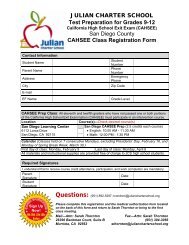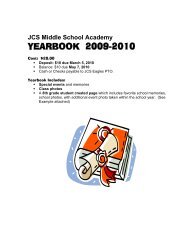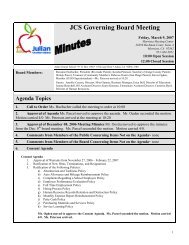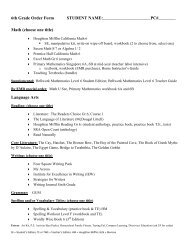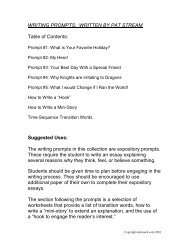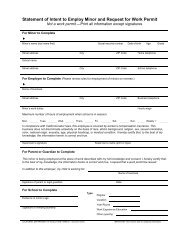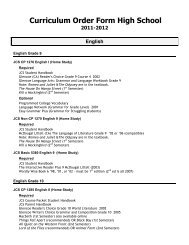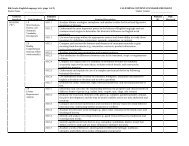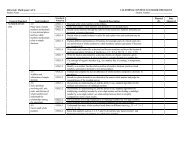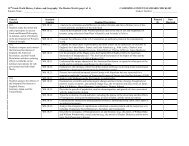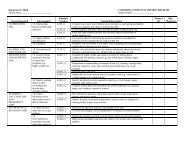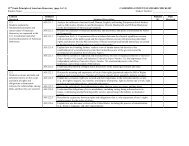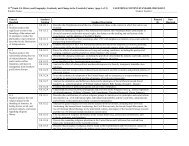2009-2010 Self-Study WASC Action Plan - Julian Charter School
2009-2010 Self-Study WASC Action Plan - Julian Charter School
2009-2010 Self-Study WASC Action Plan - Julian Charter School
Create successful ePaper yourself
Turn your PDF publications into a flip-book with our unique Google optimized e-Paper software.
Findings<br />
CHALLENGING L EARNING E XPERIENCES<br />
• Between 50-75% of instructional strategies utilize a<br />
student-centered approach to teaching and learning<br />
core academic subjects.<br />
• Differentiated instruction<br />
• Inquiry-based learning<br />
• Learning activities are rarely the same for all students.<br />
• Learning experiences may be interdisciplinary, crossage<br />
(all children within a family are involved with the<br />
same topic of study), and experiential.<br />
• Specialist-designed lessons are evaluated against rigor<br />
and relevancy to student experiences and whether the<br />
authentic application of knowledge and understanding<br />
are frequently present.<br />
• Activities where students act as co-creators of knowledge<br />
along with other students and teachers are<br />
becoming increasingly more common.<br />
• Although still building expertise, teacher and parent<br />
engagement with digital technologies has led to more<br />
student-centered learning. Examples include:<br />
• Digital Citizens Unite, Online Production Design,<br />
“published” work products, (online) peer editing,<br />
collaborative or individual student-designed<br />
content, global technology projects, photo journal<br />
essays, and topical video production<br />
• Project-based assignments promote engaged and<br />
challenged students in all programs. Examples include:<br />
• Creation of math games (MMA), meteorology<br />
research (AA), current events project (SDA), tower<br />
project (PVA), SDLC Times (student-produced<br />
newsletter), novel songs, movie poster project,<br />
ancient man magazine, Egyptian skit, Photo Story,<br />
movie creation, Glogster and erosion projects<br />
• Students are involved in co-curricular activities to<br />
extend their learning experiences.<br />
• Garden clubs<br />
• Student-led tutoring program for refugees<br />
• Service learning project involving the re-vegetation<br />
of burned areas in the east county<br />
• Community service as part of senior projects<br />
• <strong>School</strong>wide culture of high expectations.<br />
Evidence<br />
• Classroom and student<br />
work observations<br />
• Student notebooks, portfolios<br />
and project photos<br />
• Rubric, instructions, and<br />
student assignments<br />
• Rubrics provided when<br />
work is assigned<br />
• Senior project writing and<br />
artifacts<br />
• Assignments in online<br />
grade book/JCS Online<br />
• ReportWriter specialist<br />
and facilitator assignments<br />
Note:<br />
• Developing a unit or<br />
course of study explicitly<br />
based on the ESLRs<br />
demands a studentcentered<br />
approach to<br />
learning; PLCs are moving<br />
to the point where they<br />
can develop model units in<br />
the core curricular areas.<br />
Most Recent Survey Results:<br />
• 91.4% of students feel that<br />
their educational program<br />
is preparing them for their<br />
future.<br />
• Majority of parents indicate<br />
that students are<br />
being educated in a<br />
manner that meets<br />
expectations and allows<br />
for personalization and<br />
student success.<br />
• Class syllabi, parent<br />
meetings, orientations,<br />
back to school nights<br />
Chapter 4: <strong>Self</strong>-<strong>Study</strong> Findings: Instruction<br />
72 <strong>Julian</strong> <strong>Charter</strong> <strong>School</strong> Focus on Learning <strong>2009</strong>-<strong>2010</strong>



